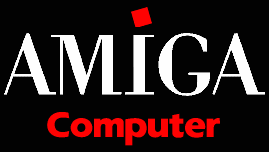










The History Of The

Computer
For it is the doom of men that they forget...
Russian translation
I hope that the link above to the translation of this page is
accurate and helpful to all Russian readers who arrive here.
Please note that I have had no part in the translation and
have no control over the edubirdie site.
A Brief History of the Amiga
The Amiga was bought from its original owners (who were very much out of money after developing the machine) by Commodore, maker of the then very popular C64. Commodore was looking for a successor to the C64 and needed a competitor for Atari's ST.
For five years, however, Commodore left advertising to the users, caring next to nothing about bringing the Amiga to the attention of the computing masses and the corporate world. In all honesty, the corporate world would probably not have understood what the Amiga could offer: Sound? Graphics? Ah, yes, a game computer. <Bzzzzt!>
Despite this attitude, the Amiga made silent inroads into the video industry. Equipped with NewTek's Video Toaster to handle the special effects for TV studios, the Amiga established itself as a real multimedia powerhouse computer and made possible the low-cost and high-quality effects seen on television shows such as SeaQuest, Startrek, Babylon 5, etc.
By the early 1990s, however, Commodore's upper managment had still no more clue about the nature of the Amiga than does your average slime mold: Irving Gould, Mehdi Ali, and fiends [sic] canceled advanced hardware projects, stopped production of the best-selling Amiga 500 in favor of an inferior and more expensive design, and finally succeeded, by April 1994, to run Commodore Business Machines straight into the ground.
The Amiga Guide to the Galaxy refers to Commodore's management as ``A bunch of mindless jerks who will be the first to be lined up against the wall and shot when the revolution comes.''
A year later, the Amiga was bought by the German PC manufacturer ESCOM AG for a mere $10 million. ESCOM, was just entering a huge expansionist phase but when the entire computer industry suffered economic setbacks in early 1996, ESCOM quickly stumbled and crashed after financially overextending itself with massive store purchases and other expansions (contrary to popular belief, the purchase of the Amiga was a relatively minor contributor to the problem; ESCOM had much more serious debts.)
Almost a year later, in May 1997, the American computer manufacturer Gateway 2000 acquired all assets of Amiga Technologies and created Amiga International Inc. This new company focused on reconnecting the many exciting resources and technologies that had never given up on the Amiga during the years of uncertainty.
Alas, Gateway's interest in the Amiga shifted increasingly to the valuable patents that had come with the Amiga purchase. By the middle of 1999 key people of Amiga International Inc. were laid off or left the company when it became clear that Gateway's interest in the Amiga as a platform was waning or dead.
These people reformed, however, received funding, and bought the rights to the Amiga from Gateway and launched Amiga Inc. with the start of the year 2000. Since then they've invested great efforts, partnered with numerous industry giants, and driven forward with the same philosophy that defined the Amiga in its hey-day: innovation and coolness.
Whether Amiga Inc. will ultimately succeed in bringing a modernized Amiga back into the hands of millions and recover the technological edge that it once held against the other platforms is still something to be seen. The progress that Amiga Inc. has made, the work they have demonstrated, and the continued committment of the company speaks better than anything that Amiga's prior corporate ``parents'' have promised or delivered.
| ``Perfection. Excellence. What a passionate lover. But once having tasted the lips of excellence, once having given oneself to its perfection, how dreary and burdensome and filled with anomie are the remainder of one's waking hours trapped in the shackled lock-step of the merely ordinary, the barely acceptable, the just okay and not one stroke better.'' |
| -- Harlan Ellison |
The alteration of any part of this content by manual or automated means (adding, removing, or in any other way altering links, text, or images) constitutes misrepresentation of our content in violation of United States copyright law. For more details, please see our content ownership details page for elaboration.



